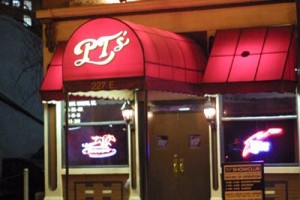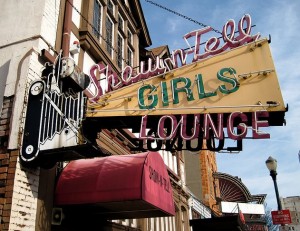New Law in Louisville Could Be Big
January 20, 2011 by admin
Filed under Blog, pornography
Taking small steps to curb or end the trafficking of pornography and illicit sexual activity throughout our communities might seem like it doesn’t make a big difference. The absolutely massive amounts of pornography and scandalous sexual activity (not to mention illegal and morally reprehensible) running rampant everywhere, often seems like a daunting task to overcome. Many believe that we can’t even make a dent in the $100+ Billion dollar pornography industry. This is not the case! Small chunks will eventually make all the difference in the world. Here’s a great story about a law in Louisville, Kentucky that will help.
Taken from a Louisville, Kentucky based website:
 Operators of adult businesses in Louisville are pinning their last hope on an appeal to the U.S. Supreme Court in a seven-year battle with the city over a no-nudity ordinance they say would effectively shut them down. Unless the nation’s highest court intercedes, city officials say they’ll begin enforcing the ordinance as early as February, effectively ending nude dancing and, eventually, alcohol sales at the city’s strip clubs. If that happens, then adult businesses may as well shut their doors, said attorney Frank Mascagni III, who represents Déjà Vu and PT’s Showclub, because he said no one is going to go to a strip club to buy an overpriced soda and watch a woman dance in a “G-string and pasties.”
Operators of adult businesses in Louisville are pinning their last hope on an appeal to the U.S. Supreme Court in a seven-year battle with the city over a no-nudity ordinance they say would effectively shut them down. Unless the nation’s highest court intercedes, city officials say they’ll begin enforcing the ordinance as early as February, effectively ending nude dancing and, eventually, alcohol sales at the city’s strip clubs. If that happens, then adult businesses may as well shut their doors, said attorney Frank Mascagni III, who represents Déjà Vu and PT’s Showclub, because he said no one is going to go to a strip club to buy an overpriced soda and watch a woman dance in a “G-string and pasties.”
“They’re going to run all of these businesses out of town,” he said of the city. About 25 adult businesses, including several adult DVD and bookstores, have sued to stop the ordinance, which would eliminate all-nude dancing and alcohol sales, and force club owners and employees to pay licensing fees. Clubs will be allowed to sell alcohol until their current license expires, but they will not be allowed to renew, officials said. The ordinance also would halt touching and direct tipping of dancers by patrons, prohibit lap dances, and enact a 6-foot buffer zone between dancers and patrons, as well as restrict hours of operation and force clubs to make structural changes inside and outside to deter illegal activity. Owners of adult businesses have been battling the ordinance, trying to get the courts to rule it unconstitutional, since the Louisville Metro Council passed it in 2004. They’ve lost each step of the way, most recently last spring before the Kentucky Supreme Court.
Mascagni has until the end of January to file an appeal, and says he’ll do so, even as he acknowledges that chances are slim that the U.S. Supreme Court will hear arguments in the case. Even if the high court decides to hear the case, Mascagni said, that likely wouldn’t happen until 2012. City officials, meanwhile, are moving ahead with plans to enforce the ordinance, said Bill Patteson, a spokesman for the Jefferson County Attorney’s Office. “The process has not stopped,” Patteson said. Initially, he said, citations and fines will be issued only on violations related to portions of the ordinance that are the easiest to enforce, such as eliminating direct touching and private lap dances.
U.S. Supreme Court will hear arguments in the case. Even if the high court decides to hear the case, Mascagni said, that likely wouldn’t happen until 2012. City officials, meanwhile, are moving ahead with plans to enforce the ordinance, said Bill Patteson, a spokesman for the Jefferson County Attorney’s Office. “The process has not stopped,” Patteson said. Initially, he said, citations and fines will be issued only on violations related to portions of the ordinance that are the easiest to enforce, such as eliminating direct touching and private lap dances.
Mascagni said he felt he had to try to fight the new law because he believes Metro Government is trying to legislate morality. “Politicians shouldn’t be regulating human behavior,” he said. Metro Council member Madonna Flood, D-24th District, who was one of the sponsors of the ordinance, said it arose from planning and zoning issues with some newly opened adult bookstores in south Louisville and was intended to combat property devaluation and criminal activity. It was not designed to “legislate morality” or shut down the businesses, she said. “They have the right to operate, but I have an obligation to protect property owners,” she said.
Mascagni said club owners have indicated to him they would look at the economic impact of the ordinance and consider closing or moving if profits suffer. “I believe the government has the right to regulate industries — we all know civilized society needs rules,” Mascagni said. “My problem with this (ordinance) is the city government is making conduct that is otherwise lawful so restrictive that my companies will have to go out of business.” A letter outlining the guidelines of the ordinance is being crafted, and will be distributed to businesses, Patteson said. Bill O’Brien, director of the civil division for the County Attorney’s office, called the potential high court appeal a “last desperate attempt to avoid regulations.” “I really do believe they’ll say no,” he said of the Supreme Court. Jim Mims, director of the city’s Department of Codes and Regulations, which will oversee enforcement, said he understands some businesses will have to make structural changes to comply with the guidelines, such as moving stages or adding lighting. He said the city will give them 30 to 45 days once they receive the letter to do so. “We will work with operators and property owners to make sure that is the case,” he said. “Our mission is not just to penalize people; our mission is to get these operations in compliance with the ordinance.”




